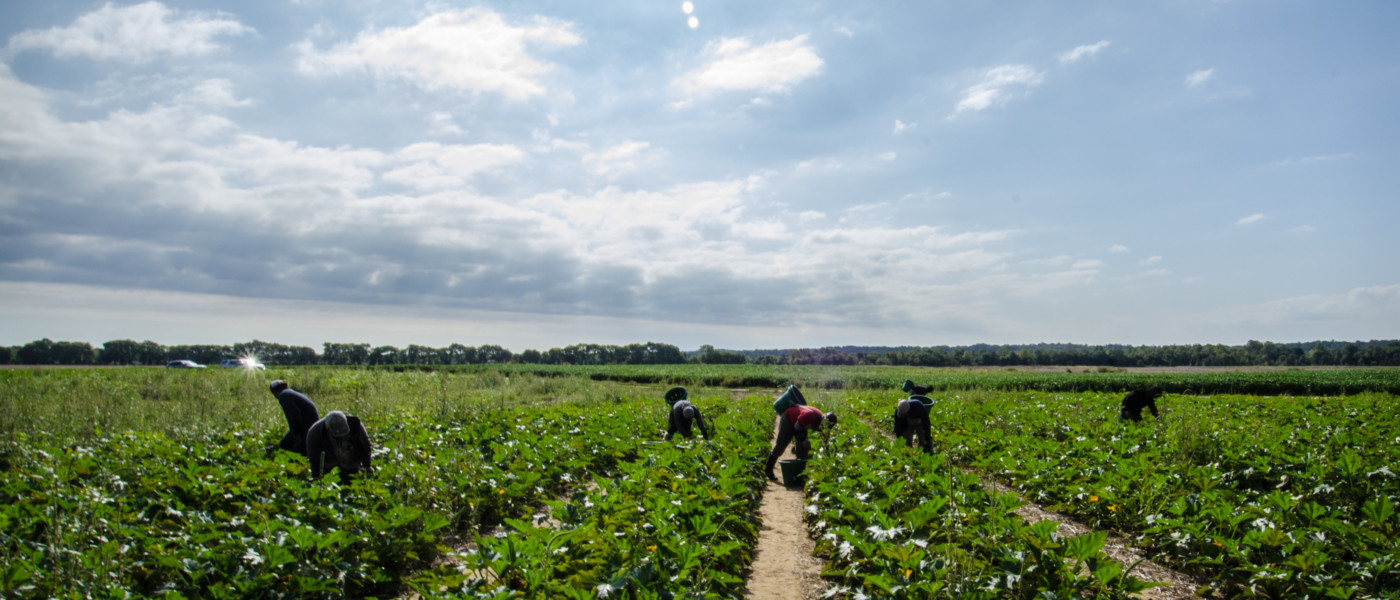Healthcare workers are heroically fighting the COVID-19 pandemic the best they can, improvising and innovating, despite federal disinvestment, the de-prioritization of science and a mentality of corporate profit over people. They are working tirelessly while putting their lives on the line—as are food workers and food producers. Since the beginning of this crisis, while many of us have transitioned to stay home, they have remained hard at work to provide for our survival. Similar to the healthcare system, our food system has been radically underfunded and under prioritized, with corporations and profits driving decision-making.
The 21+ million members of our food system are ready to continue growing, raising, catching, processing, and delivering the healthy food we need. They are all essential workers. Without them, none of us will eat. In order to get through this crisis and lay a stronger foundation for our future as the climate changes and pathogens evolve, we must guarantee the most basic of human rights—the right to food. We must invest in our farm and food system, from farm and boat to plate, and take care of the farmers, ranchers, fishers, farm- and food-workers who are providing the essential service they can deliver at this critical time: feeding their communities. And we must ensure a living wage for all Americans, especially those whose labor is essential to moving food to all of us.
While our nation’s farmers and food workers labor tirelessly to put fresh, healthy food on our tables they must also navigate a system that is rooted in inequities that continue today. The theft of land from indigenous peoples, and the subsequent kidnapping and enslavement of people from Africa to work the land, laid the foundation for a food system based on extraction from people and the land. Small and mid-sized farms and fishing operations struggle to survive in a system designed to support corporations that put profit over people and the planet. Food and farm workers bear the brunt of these hazardous working conditions and unfair pay. All have been failed by federal farm and fisheries policies, especially farmers, ranchers and fishers of color, tribal nations and the workers who have been excluded from protections of the Fair Labor Standards Act.
Even before the pandemic, 37 million people—including 11 million children—were struggling to have enough food to eat, while 4 out of 5 U.S. workers were living paycheck to paycheck. Food workers themselves were twice as likely to be dependent on federal nutrition programs due to poverty-level wages.
The truth is that lack of access has never been about a lack of food—it’s been a problem of distribution, with people of color and tribal nations across all sectors impacted disproportionately. As the pandemic threatens to strip even more families of their income, more will be unable to afford healthy, safe and nutritious food in the near future. To meet these dual needs of ensuring equitable access of food for all AND supporting the people, not corporations, behind the production, procurement and distribution of food, National Family Farm Coalition (NFFC), Northwest Atlantic Marine Alliance (NAMA), WhyHunger, Farm Aid, HEAL Food Alliance and Institute for Agriculture Trade and Policy (IATP) call on Congress to ensure that any stimulus package prioritize the following:
- Center the farmers, ranchers, fishers and food workers of color who are most impacted by systemic inequities of our food system
- Ensure a fair and safe livelihood for farmers, ranchers, fishermen and all farm, fish and food workers
- Bolster local & regional food systems poised to feed communities
- Enact systemic reform to build resilience for all producers, workers and eaters
- Protect small and mid-sized farms and fishing operations from corporate mergers and acquisitions. No one should lose their farms or boats.
- Ensure every person living in the United States has a dignified means of accessing nutritious food
We’ve compiled our comprehensive policy recommendations below.

COVID-19 Stimulus Package for the Food System
Through no fault of their own, farmers, ranchers, fishermen and all food producers are facing a crisis unlike any they have ever seen, encountering new threats to their production and markets sparked by COVID-19 while they endure a multi-year slump in prices for their goods, volatile trade disputes, frequent natural disasters, and climate disruption. What’s clear is that no farmer should lose their farm and no fisherman should lose their boat because of the crisis sparked by COVID-19, and farm, fish and food workers should likewise not lose their livelihoods.
In stark contrast to the Administration’s approach to a “trade bailout” through the Market Facilitation Program, Congress and the federal government need to act decisively to ensure that all farmers, ranchers, and fishermen are included in any broader stimulus package related to COVID-19, particularly small and midsized operations, limited resource producers, farms operated by farmers of color, and tribal nations who have often fallen through the cracks of federal farm policy. This will require a multi-faceted approach that invests in the innovative potential of food producers, ensures fair livelihoods for all who have a hand in bringing food to American families, offers meaningful debt relief and appropriate credit to meet the demands of the moment, and ensures a more resilient food system for producers, workers and consumers alike.
Time is of the essence.
We call on the President, the U.S. Secretary of Agriculture, and the Secretary of Commerce to declare a national disaster in both the agriculture and seafood sectors to unlock existing federal emergency and disaster funding and services, and enable Congress to appropriate further relief funds for the farm and seafood sector. In addition, federal agencies must aggressively use every tool available to keep families in their homes, on the land, and on the water.
Congress must do the following in any stimulus package enacted to address the COVID-19 crisis:
Ensure a Fair Livelihood for Farmers, Ranchers, Fishermen and All Farm, Fish and Food Workers
- Establish an emergency payment program for farmers, ranchers, fishermen, and food producers who can demonstrate revenue losses due to COVID-19 emergency measures, including producers who are sourcing local and regional markets and sourcing directly to individuals, schools, local institutions, and food hubs.
- Forgive all federal direct and guaranteed loan debt and suspend debt payments (both principal and interest) for two years for all producers.
- Suspend vessel loan payments (both principal and interest) to private lenders for two years.
- Increase funding for direct and guaranteed loans, maintaining existing loan limits.
- Waive the eligibility restriction for new FSA loans based on past debt write-down or other loss to the agency.
- Waive the prohibition on refinancing of other debt with FSA direct loans.
- Implement zero-interest for all FSA direct loans and utilize the Interest Assist program to buy-down guaranteed loan interest to zero percent.
- Require that all borrower rights provided for FSA direct borrowers be extended to all guaranteed loan borrowers.
- Adapt all USDA and DOC credit, funding and program implementation requirements to meet the evolving needs of food producers through measures such as extending deadlines, waiving cost-share requirements, ensuring effective outreach, or other actions.
- Provide unemployment benefits to farm, food and fish workers through businesses that can demonstrate inability to pay their workers and contractors because of COVID-19 emergency measures.
- Provide emergency funding for businesses that can demonstrate revenue losses to offer paid sick days to farm, fish and food workers who provide essential services during the COVID-19 crisis.
- Establish an immediate moratorium on work permit restrictions for guest workers and migrant workers who have been laid off or terminated.
- Provide access to free COVID-19 testing and medical care to all farm, fish and food workers, regardless of immigration status and size of workplace, including workers on H-2A or migrant worker visas, and eliminate penalties for all workers who become ill for inability to complete a contract due to the illness.
Bolster Local & Regional Food Systems Poised to Feed Communities
- Quadruple the budget, loosen barriers to application, and abandon all eligibility and access restrictions to SNAP and Women, Infants and Children (WIC) programs.
- Establish an immediate moratorium on the Public Charge Rule which would disqualify immigrants who receive public assistance from obtaining permanent residency status or U.S. citizenship.
- Exempt farmers’ and seafood markets and local food hubs from definitions of “public places” and categorize them as essential services, eligible for emergency assistance funding for operations and food safety training and materials, to continue feeding local communities.
- Double funding for the Fair Food Network’s Double Up Food Bucks and allow program funds to cover direct sales from participating family-scale farms and boats.
- Increase funding for USDA Local Agriculture Marketing Program (LAMP) by $200,000,000 and temporarily waive cost-share requirements to strengthen local food system resilience.
- Bolster food security for tribal nations by: 1) Providing additional funding of at least $100 million for the Food Distribution Program on Indian Reservations (FDPIR) and enhancing FDPIR for food, administration, and infrastructure, along with providing administrative flexibility; 2) Establishing an Emergency Tribal Food Assistance Fund; and 3) Directing USDA to consider ways to allow dual participation in SNAP and FDPIR simultaneously.
Enact Systemic Reform to Build Resilience for All Food Producers, Workers and Eaters
- Strengthen rural economic resilience and prevent food shortages by establishing supply management programs, a parity pricing system, and strategic food reserves that ensure producers and workers receive a living wage and consumers have access to high-quality and stable agricultural goods and seafood.
- Prohibit crisis profiteering and corporate consolidation by enacting an immediate moratorium on mergers and acquisitions in the seafood and food & agriculture sectors and enforce antitrust laws.
- Support fair agricultural contracts, producers’ rights, and competitive markets by reissuing and finalizing the USDA Farmer Fair Practice Rules.
- Increase transparency in the food system and allow eaters to support American farmers, ranchers, and fishermen by reinstating and expanding mandatory Country of Origin Labeling (COOL) for meat, dairy, and seafood.



